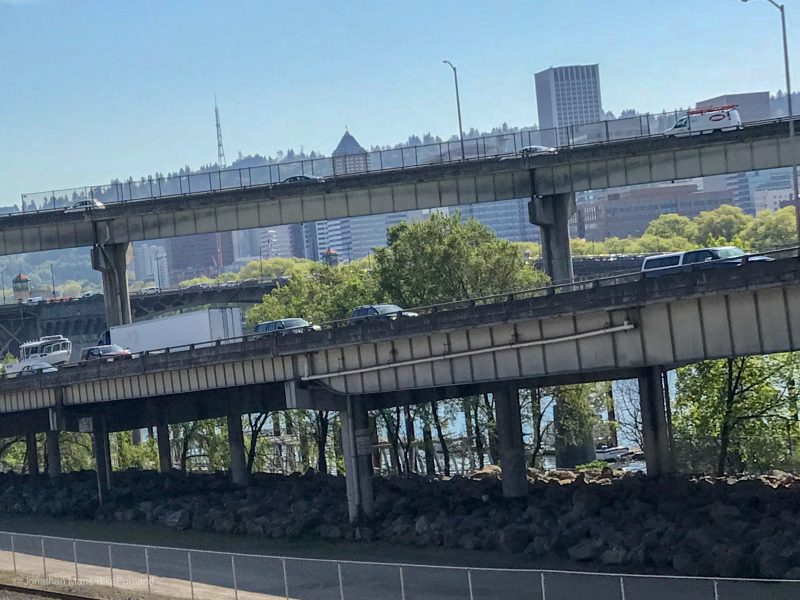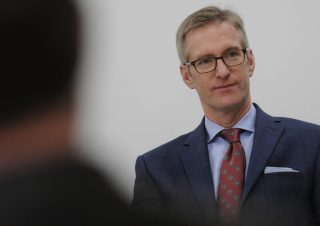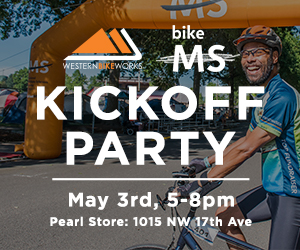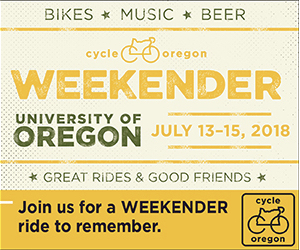
Mayor Ted Wheeler supports an ODOT megaproject that invests hundreds of million of dollars in more of this.
(Photos: Jonathan Maus)
When it comes to transportation, recent statements from Portland Mayor Ted Wheeler paint a confusing picture of the future.
On one hand, Wheeler seems to understand the urgency of climate change. On the other hand, he supports the I-5 Rose Quarter project that adds lanes to a freeway to improve driving conditions in our central city.
On one hand, he understands that the future of transportation is in flux. On the other hand, he supports single-occupancy vehicle use — a form of urban transportation whose time has long since passed.
Confused or simply wrong, Wheeler — someone who is ostensibly a progressive — is on the wrong side of this issue.
“Cars are ruining our cities,” is the blunt but accurate headline of a New York Times op-ed published this week. It’s an excellent summary of why investing in new freeway lanes — especially in urban areas like Portland’s Rose Quarter — is complete and utter folly.
And that’s just one recent article that demonstrates how the Overton Window on freeway expansion as a salve for congestion is beginning to shift. This is due to many factors, key among them is a growing awareness that the transportation sector continues to hemorrhage greenhouse gases while being largely ignored by politicians — even Democrats like Wheeler.
Last week ClimateWire published an article titled, “Cars threaten climate goals in blue states“, which included this passage: “Liberal states’ carbon-cutting plans are stuck in traffic. Transportation emissions [which are 54 percent of total GHG emissions in Oregon] threaten to undercut blue states’ climate goals, raising questions about their ability to lead U.S. climate efforts at a time when the federal government is rolling back environmental regulations.”
But wait, I’m a “climate change mayor” Wheeler would contend.
To which journalist and activist Alissa Walker would reply, as she did in an article on Curbed.com this month, “You can’t be a ‘climate mayor’ if you’re making more room for cars. Sorry — that’s not how it works.” “If these 402 U.S. mayors are truly adhering to the goals set forth in the Paris climate accord,” she continued, “then none of them can build infrastructure that encourages more emissions by more cars and trucks.”
And don’t let ODOT’s PR spin fool you: The I-5 Rose Quarter project is an attempt to alleviate congestion by adding lanes to a freeway. ODOT can claim it’s about safety and “operational improvements,” but their official infographic on the $5.3 billion transportation plan that includes funding for the project makes it clear: “Relieving congestion bottlenecks will help people get where they want to go quickly and reliably. New lanes on I-5 at the Rose Quarter will save motorists 2.5 million hours wasted in gridlock each year.”
And Wheeler himself doesn’t even try to hide it.
He was asked about the project during an interview on KATU News (Portland ABC affiliate) on April 15th.
KATU reporter:
“As we talk about congested freeways, some would argue against expanding freeways. What would you say to those who say we shouldn’t be adding lanes to area highways?”
Mayor Wheeler:
“Well, you know, highway expansion generally, like building a Mt. Hood freeway, I would agree with them in that case. The lightning rod has really been the work that’s been proposed around the Rose Quarter. That is, two auxiliary lanes that are predominantly going to be built to fix the problem there with the bottleneck. You have several lanes going down to fewer. And you have two ramps coming on, and one going off. So this [project] is going to create auxiliary lanes to help things speed through there a little bit better and actually reduce the number of accidents. So I’m very supportive of that project.”
I’m not sure what’s more disappointing: That Wheeler parrots ODOT talking points and is fooled by the agency’s sly, modern-day tactics to build mega-projects — or the fact that he appears to not understand the connection between investing in urban freeways and increased greenhouse gas emissions, air pollution (Portland ranks 32nd in the nation for worst air pollution), or the role interstate freeways continue to play in the “structured inequality” of our country.
But don’t take it just from climate change experts or journalists. Even Portland-based high-tech CEO Nat Parker is on the opposite side of Wheeler on this issue. “You can’t build your way out of congestion,” the leader of Moovel, an urban mobility company, said in a recap of the TechFestNW event in The Willamette Week earlier this month. “People will drive more if they think there is more room to do so.”
Fortunately there’s a shred of hope. Wheeler is young and seems to be open to change. At a city council meeting on March 15th he shared a version of the future that appeared to look beyond the car-driving status quo:
“I don’t think we know sitting here today what the transportation situation is going to look like even 15 years from now. Those who follow transportation planning believe we are literally right on the edge of a transportation revolution which could shift the demand for parking. It could shift the kind of infrastructure investments we need to make. It could shift the whole question of mobility for people who live with disabilities or older adults. I would be very reluctant to lock ourselves in today. It would sort of be like locking ourselves into an IBM Selectric in 1984.”
(Yes! More of this please! And just FYI, carrying ODOT’s water on a freeway expansion project is the very definition of “locking ourselves in.”)
Unfortunately, that statement came during a presentation about a new master plan for Washington Park. Ironically, Wheeler should take a closer look at that plan for Portland’s marquee park and apply its principles to the central city: Put people and safe, healthy mobility first; push driving to the outskirts; invest in transit and protected bikeways; and create entire areas where there’s no driving allowed at all.
The future of Portland — and to some degree Wheeler’s legacy — depends on building a better city. Not on building a better freeway.
— Jonathan Maus: (503) 706-8804, @jonathan_maus on Twitter and jonathan@bikeportland.org
Never miss a story. Sign-up for the daily BP Headlines email.
BikePortland needs your support.
The post Editorial: Freeways, the future, and Mayor Ted Wheeler appeared first on BikePortland.org.
from BikePortland.org https://ift.tt/2HzEKff



No comments:
Post a Comment